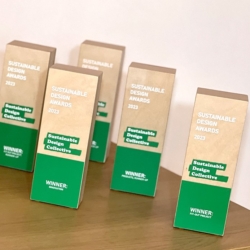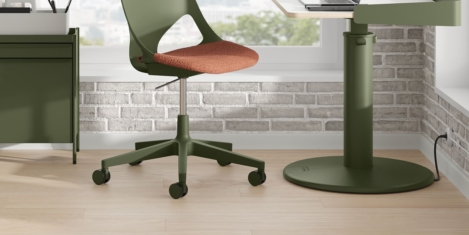January 18, 2024
Entries now open for the Sustainable Design Collective Annual Awards
 The Sustainable Design Collective (SDC) – a think tank of leading design professionals working in the office workplace sector – has opened entries for its annual awards. The announcement follows confirmation of the dates for the second SD Forum to be held on 25th April at the Crypt on the Green in Clerkenwell, London. Free to enter, the Awards are designed to champion ‘best practice’ and highlight innovations leading to greater sustainability within the office workplace. There are three categories: New build and retrofit projects; New products and materials; Innovation including new services or IT solutions as well as collaborations with not-for-profit organisations. (more…)
The Sustainable Design Collective (SDC) – a think tank of leading design professionals working in the office workplace sector – has opened entries for its annual awards. The announcement follows confirmation of the dates for the second SD Forum to be held on 25th April at the Crypt on the Green in Clerkenwell, London. Free to enter, the Awards are designed to champion ‘best practice’ and highlight innovations leading to greater sustainability within the office workplace. There are three categories: New build and retrofit projects; New products and materials; Innovation including new services or IT solutions as well as collaborations with not-for-profit organisations. (more…)











 A new poll claims that over one quarter (26 percent) of employees in the UK do not trust their CEO to be open and honest, while 24 percent do not trust their senior leadership to do the same. According to the survey of 2,000 employees in the UK from Personio, transparency and employer-employee communication are pivotal to a positive employee experience and trust in the workplace. The research suggests that feeling unheard by leadership could be fuelling employees’ distrust. Over a quarter (28 percent) of employees surveyed say that they are not given a chance to share feedback to leadership on their experiences. Meanwhile, less than half (46 percent) of employees feel that leadership in their organisation actually listens and acts on any feedback when given from staff.
A new poll claims that over one quarter (26 percent) of employees in the UK do not trust their CEO to be open and honest, while 24 percent do not trust their senior leadership to do the same. According to the survey of 2,000 employees in the UK from Personio, transparency and employer-employee communication are pivotal to a positive employee experience and trust in the workplace. The research suggests that feeling unheard by leadership could be fuelling employees’ distrust. Over a quarter (28 percent) of employees surveyed say that they are not given a chance to share feedback to leadership on their experiences. Meanwhile, less than half (46 percent) of employees feel that leadership in their organisation actually listens and acts on any feedback when given from staff. 
 Gossiping at work can have serious negative impacts on your career, according to new research by Durham University Business School and NEOMA Business School. Not only are gossipers frowned upon by other work colleagues, they also become socially excluded in the company, and can experience negative career-related impacts as a consequence of their storytelling.
Gossiping at work can have serious negative impacts on your career, according to new research by Durham University Business School and NEOMA Business School. Not only are gossipers frowned upon by other work colleagues, they also become socially excluded in the company, and can experience negative career-related impacts as a consequence of their storytelling. 




















December 16, 2023
Hybrid working: the importance of having the right strategy
by Andrew Mawson • Comment, Flexible working